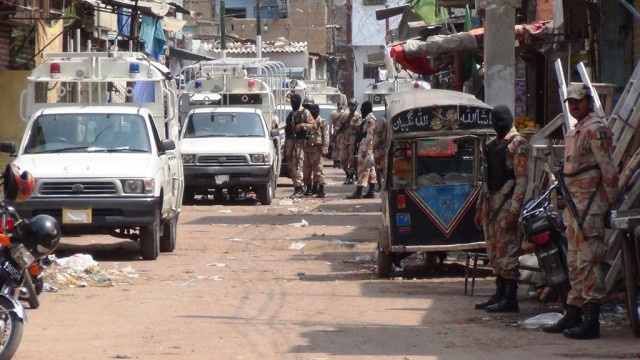A definite maybe
The yet-unanswered question is whether political courage exists beyond the merely rhetorical.

The yet-unanswered question is whether political courage exists beyond the merely rhetorical. PHOTO: MOHAMMAD SAQIB
On the face of it, the intentions of the government at federal and provincial levels are to mitigate the appalling security situation in Karachi even if the city cannot be completely pacified; and the Karachi law-and-order problem is not on a par with the hunt for Dark Matter or the Higgs Boson. At root, it is about criminality, corruption in political, civil and police structures and entities, and an usurping of political processes by a culture of violence, greed and a willful disregard for the wellbeing of the ordinary man, woman and child who lives in the city. In the process, political coinage is devalued countrywide as Karachi becomes the benchmark, setting the standard for political life in the rest of the country and redefining in doing so, what is normative and acceptable political expression. Confronting and reshaping that malignant paradigm will take political courage. The yet-unanswered question is whether that courage exists beyond the merely rhetorical.
The expectation is that the police — a highly politicised force — will support the Rangers, who are largely politically neuter. It remains to be seen how this will work in practice as the Rangers are going to be targeting areas in which elements of the police have a vested, and venal, interest.
The police are reported to be less than delighted with this development. There is no shortage of intelligence derived from both civilian and military sources as to exactly where the targets are located, but as referenced above, there have to be doubts in that the Rangers and police will be knocking on the doors of houses whose occupants left hours or days before. Perhaps, the government should have been a little more tight-lipped as to its intentions.
Four committees have been set up to monitor the coming operation, which on paper is entirely laudable, but hedged with caveats. Interagency cooperation is generally poor across the entire spectrum of governance, both federal and provincial.
Bringing together Rangers, the police, NADRA, civil society representatives and the media, as well as representatives of the legal profession, may be applauded for its inclusivity and stakeholder ownership, but the practical realities of coordination between newly-formed bodies that are working in a hurry without a tried and tested set of protocols will be fraught with difficulty. Moreover, they are going to be operating in an environment where real conflict is going to be a daily feature, and decisions that will have political consequences, not all of them comfortable for all players, are going to have to be made.
The best that can be said of the proposals to bring a modicum of peace to Karachi is that they fall into the realm of ‘the definite maybe’. The prime minister has ruled out the use of the army and much is going to depend on the mettle of the PPP-led Sindh provincial government, and the coming days will be the sternest of tests.
Published in The Express Tribune, September 6th, 2013.
Like Opinion & Editorial on Facebook, follow @ETOpEd on Twitter to receive all updates on all our daily pieces.














COMMENTS
Comments are moderated and generally will be posted if they are on-topic and not abusive.
For more information, please see our Comments FAQ